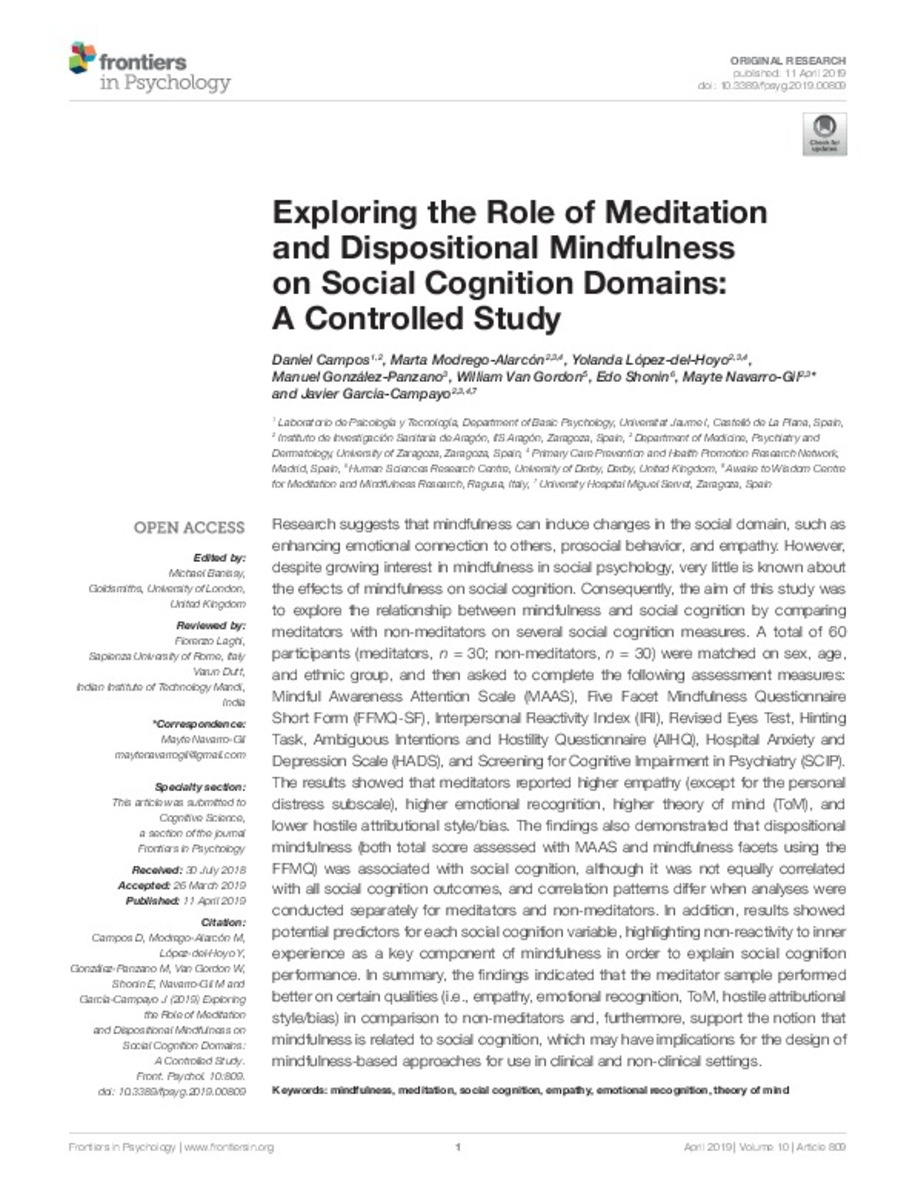Mostrar el registro sencillo del ítem
Exploring the Role of Meditation and Dispositional Mindfulness on Social Cognition Domains: A Controlled Study
| dc.contributor.author | Campos, Daniel | |
| dc.contributor.author | Modrego-Alarcón, Marta | |
| dc.contributor.author | López-del-Hoyo, Yolanda | |
| dc.contributor.author | González Panzano, Manuel | |
| dc.contributor.author | Van Gordon, William | |
| dc.contributor.author | Shonin, Edo | |
| dc.contributor.author | Navarro Gil, María Teresa | |
| dc.contributor.author | Garcia-Campayo, Javier | |
| dc.date.accessioned | 2019-06-07T07:43:04Z | |
| dc.date.available | 2019-06-07T07:43:04Z | |
| dc.date.issued | 2019-04-11 | |
| dc.identifier.citation | CAMPOS, Daniel; MODREGO-ALARCÓN, Marta; LÓPEZ DEL HOYO, Yolanda; GONZÁLEZ PANZANO, Manuel; VAN GORDON, William; SHONIN, Edo; NAVARRO GIL, María Teresa; GARCÍA-CAMPAYO, Javier (2019). Exploring the Role of Meditation and Dispositional Mindfulness on Social Cognition Domains: A Controlled Study. Frontiers in Psychology, v. 10 | ca_CA |
| dc.identifier.uri | http://hdl.handle.net/10234/182753 | |
| dc.description.abstract | Research suggests that mindfulness can induce changes in the social domain, such as enhancing emotional connection to others, prosocial behavior, and empathy. However, despite growing interest in mindfulness in social psychology, very little is known about the effects of mindfulness on social cognition. Consequently, the aim of this study was to explore the relationship between mindfulness and social cognition by comparing meditators with non-meditators on several social cognition measures. A total of 60 participants (meditators, n = 30; non-meditators, n = 30) were matched on sex, age, and ethnic group, and then asked to complete the following assessment measures: Mindful Awareness Attention Scale (MAAS), Five Facet Mindfulness Questionnaire Short Form (FFMQ-SF), Interpersonal Reactivity Index (IRI), Revised Eyes Test, Hinting Task, Ambiguous Intentions and Hostility Questionnaire (AIHQ), Hospital Anxiety and Depression Scale (HADS), and Screening for Cognitive Impairment in Psychiatry (SCIP). The results showed that meditators reported higher empathy (except for the personal distress subscale), higher emotional recognition, higher theory of mind (ToM), and lower hostile attributional style/bias. The findings also demonstrated that dispositional mindfulness (both total score assessed with MAAS and mindfulness facets using the FFMQ) was associated with social cognition, although it was not equally correlated with all social cognition outcomes, and correlation patterns differ when analyses were conducted separately for meditators and non-meditators. In addition, results showed potential predictors for each social cognition variable, highlighting non-reactivity to inner experience as a key component of mindfulness in order to explain social cognition performance. In summary, the findings indicated that the meditator sample performed better on certain qualities (i.e., empathy, emotional recognition, ToM, hostile attributional style/bias) in comparison to non-meditators and, furthermore, support the notion that mindfulness is related to social cognition, which may have implications for the design of mindfulness-based approaches for use in clinical and non-clinical settings. | ca_CA |
| dc.format.extent | 13 p. | ca_CA |
| dc.format.mimetype | application/pdf | ca_CA |
| dc.language.iso | eng | ca_CA |
| dc.publisher | Frontiers Media | ca_CA |
| dc.relation.isPartOf | Frontiers in Psychology (2019), v. 10 | ca_CA |
| dc.rights | Atribución 4.0 Internacional | * |
| dc.rights.uri | http://creativecommons.org/licenses/by-sa/4.0/ | * |
| dc.subject | Mindfulness | ca_CA |
| dc.subject | Meditation | ca_CA |
| dc.subject | Social cognition | ca_CA |
| dc.subject | Empathy | ca_CA |
| dc.subject | Emotional recognition | ca_CA |
| dc.subject | Theory of mind | ca_CA |
| dc.title | Exploring the Role of Meditation and Dispositional Mindfulness on Social Cognition Domains: A Controlled Study | ca_CA |
| dc.type | info:eu-repo/semantics/article | ca_CA |
| dc.identifier.doi | https://doi.org/10.3389/fpsyg.2019.00809 | |
| dc.relation.projectID | Grant from the “Instituto de Salud Carlos III” of the Spanish Ministry of Economy and Competitiveness, co-funded with European Union ERDF funds (RD16/0007/0005). | ca_CA |
| dc.rights.accessRights | info:eu-repo/semantics/openAccess | ca_CA |
| dc.relation.publisherVersion | https://www.frontiersin.org/articles/10.3389/fpsyg.2019.00809/full | ca_CA |
| dc.contributor.funder | This project has received funding from DGA group (B17- 17R) and the Network for Prevention and Health Promotion in Primary Care (REDIAPP) | ca_CA |
| dc.type.version | info:eu-repo/semantics/publishedVersion | ca_CA |
Ficheros en el ítem
Este ítem aparece en la(s) siguiente(s) colección(ones)
-
PSB_Articles [1330]
Articles de publicacions periòdiques








